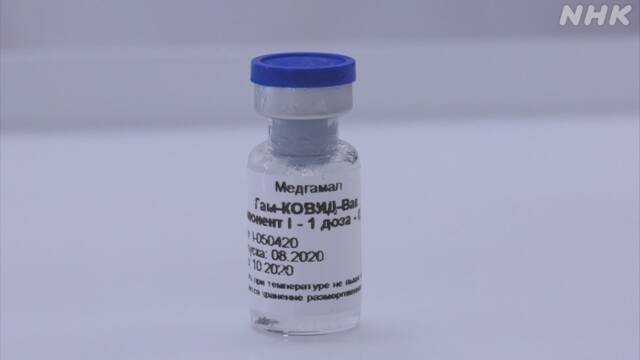Russia is strengthening its sales to Europe as some countries such as Italy began to show interest in Russian vaccines while the supply of the new coronavirus vaccine was delayed in Europe.
Russia has developed three types of vaccines for the new coronavirus so far, and of these, "Sputnik V" is being marketed overseas by a government-affiliated fund with the intention of President Putin.
According to this fund, "Sputnik V" has been published in a British medical journal as an interim report that it was 91.6% effective in the final stage clinical trial, and so far in the Middle East, Asia, etc. It means that it has been approved in more than 50 countries and regions.
In addition, the Russian side has applied to the EU-European Union drug regulator for a marketing license for "Sputnik V", and the EU side has begun reviewing this month.
It will take several months for the results to come out, but a Russian government fund said, "We are working with a pharmaceutical company to produce Sputnik V locally in Italy."
Russia is strengthening its sales as some countries such as Italy and Germany begin to show interest in Russian vaccines while the supply of vaccines in Europe and the United States is delayed in Europe.
On the 22nd of this month, Putin emphasized that the Russian vaccine was "absolutely reliable and safe," and inoculated himself the next day.
President Putin seems to have the aim of appealing to the world that Russia is playing an indispensable role in the countermeasures against the new coronavirus, which each country is having difficulty responding to.
On the other hand, in Russia, only 30% of the respondents said they were ready to inoculate "Sputnik V", and it was pointed out that the domestic manufacturing capacity was not catching up.
Inoculation to Hungarian and Slovak people begins
Hungary was one of the first in the EU-European Union to approve "Sputnik V" developed by Russia according to its own standards, and started inoculating the people in February.
On the 19th of this month, Foreign Minister Shiyarto also publicized the state of the inoculation and appealed the safety.
Regarding the vaccination of Russian-made vaccines, Foreign Minister Siyarto explained in an interview with NHK that "the EU has been procuring vaccines slowly and the amount supplied was less than expected. It was necessary to save the lives of the people."
Following Hungary, Slovakia also began inoculating Sputnik V this month.
However, domestically, there have been criticisms against Prime Minister Matovič, who approved this, saying, "We should wait for EU approval," and then the health minister has been resigning.
Hungary and Slovakia have the worst per capita mortality rates in the world due to the spread of the new coronavirus.
It also suggests the possibility of purchasing independently in Italy and Germany
With the spread of mutant virus infections and the tightening of medical care again, interest in "Sputnik V" is increasing even among countries that have emphasized EU cooperation.
Of these, Italy's Prime Minister Mario Draghi said on the 19th of this month that he should wait for the EU drug regulator's license to sell "Sputnik V", but said, "If Europe's cooperation is not successful, we will act alone on health issues. We need to be prepared to do so, "he said, suggesting that Italy could buy it on its own.
The Italian government, which puts vaccination as a top priority, has indicated that it will suspend exports of AstraZeneca vaccines to Australia earlier this month due to reasons such as vaccine shortages, and will continue to suspend exports if supply is delayed. ..
German Chancellor Angela Merkel has also suggested that Germany may purchase the "Sputnik V" on its own if Europe cannot jointly procure it in the future.
Be wary of turmoil in EU member states
The EU has set a goal of vaccination of 70% of adults in the region by this summer, but the supply of vaccines has been delayed and only about 10% of adults have been vaccinated so far.
EU drug regulators are reviewing Sputnik V, but the EU is wary of disrupting member states as some member states are vaccination before the permit is issued. ..
EU Chairman Von der Leyen said in February about Sputnik V, "I wonder why Russia is providing millions of vaccines when its people are not well vaccinated." It revealed distrust of Russia, which offered to provide vaccines.
EU drug regulators have also been cautious, saying they are "like Russian roulette", saying that safety data are still inadequate.

